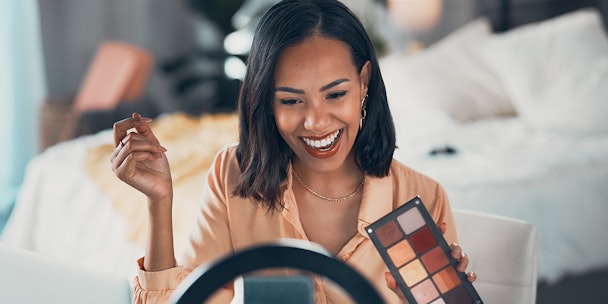Celeb-founded beauty brands – why some succeed where others fail
Rhode is riding high right now, thanks to a well-timed selfie from its founder Hailey Bieber – but brands can’t just rely on a famous founder for success, writes Joanna Hughston, head of marketing at The Goat Agency.

Celebrity founded beauty brands do get a head start compared to other challenger beauty brands / Adobe stock
Right now, the hottest beauty product on the market isn’t even a beauty product; it’s a phone case.
Yes, the Rhode ‘lip case’ is Gen Z’s current “must have” accessory thanks to a well-timed selfie from the brand’s founder/model/influencer/wife of a famous singer, Hailey Bieber.
This isn’t the first time that Rhode has enjoyed a viral moment. Last year, an influencer gifting campaign for its Pineapple Cleanser was lauded for its experiential creativity (the cleanser came enclosed in a bath bomb which the influencers had to dissolve before they could see the product).
Rhode is riding high right now, but it’s clear that brands can’t just rely on a famous founder for success. Because for every Rhode, Fenty or Rare Beauty, there are several celebrity or influencer-founded brands that have seen only a fraction of this success.
Advertisement
Take Lady Gaga’s Haus Labs or Ariana Grande’s REM Beauty. Neither of these have made quite as much noise despite the fact they arguably have bigger starpower behind them.
And when was the last time you heard about Kylie Cosmetics? Or KKW Beauty? Two brands from the world’s most famous family that were big deals on launching but are no longer making headlines – at least not in the way they used to.
So why have some brands succeeded whilst others failed? Here are six questions celeb or creator founded beauty brands need to ask themselves:
1. Does it even make sense to start with?
This question goes for every celebrity or influencer-founded brand, not just beauty.
It’s very easy to tell when an idea has been based on financial gains rather than rooted in genuine passion and interest. For example, Rihanna was already a celebrated fashion and beauty icon before she launched Fenty Beauty, and Hailey Bieber had been putting out skincare routines for some time before launching Rhode.
In comparison, audiences were quick to call out Jennifer Lopez for launching a pre-mixed cocktail line after saying for years she doesn’t drink alcohol. Then there was Jared Leto who confusingly told Vogue that he’d “never been interested in beauty products” straight after announcing the launch of his beauty brand, Twentynine Palms (which he has since parted ways with). No matter the name behind it, audiences aren’t stupid, and they won’t buy into a brand if it doesn’t feel genuine.
2. Are you speaking your audience’s language?
We talk a lot about Gen Z-marketed brands and founders, but one beauty brand founder that really understood her target audience is Trinny Woodall. The British entrepreneur, author and TV personality launched Trinny London in 2017 and the brand saw a boom during the Covid-19 lockdown. What Woodall does particularly well is that she speaks to her core customer base. She doesn’t have 20-year-olds advertising products when her primary audience is women over 35, and she concentrates on showing up where they are rather than just jumping on the latest Gen Z TikTok trend because that’s what everyone says brands should be doing.
Advertisement
3. Does it have a clear brand narrative and aesthetic that matches the founder?
Ariana Grande’s REM Beauty has a very distinctive visual identity with the products all based around space (a theme she’s drawn on in various music videos). However, where it may be lacking is a deeper meaning or purpose. Where Rihanna was so successful with Fenty is because she was one of the first beauty brands to truly champion diversity at its core, and this was something for which Rihanna was already a known advocate. Similarly, Selena Gomez has aligned Rare Beauty with mental health awareness through the Rare Impact Fund. Again, this makes sense to Gomez’ personal brand as a campaigner who’s been open about their own mental health struggles. Now, not every brand has to have a deep meaning necessarily, but I think when people hear of yet another celebrity-founded brand launch, they want to understand the why. Why should they care about this and how does it align with the celebrity they’ve already been following?
4. Is this then translating to a personality on social media?
At Goat, we talk about how brands need to think and act like creators on social media. How would you post and speak if your brand was a real person? Take Florence by Mills, founded by Stranger Things star Millie Bobby Brown in 2019. The brand is founded on principles of self-love and self-expression and their TikTok content reflects this with uplifting, relatable content focused on user-generated content (UGC). Even though the content varies, it has a clear distinctive personality.
Pretty much all the successful celebrity and creator-founded beauty brands have adopted a social-first approach, but where some have failed is that they don’t communicate their brand values and personality effectively on the platforms. TikTok, Instagram, Snapchat, YouTube; every platform is different, but the likes of Rare Beauty and Florence By Mills have still created consistency. No matter where you engage with them, it feels like the same creator posting.
Suggested newsletters for you
5. How are you creating moments in culture?
The Rhode lip case is a perfect example of a brand finding simple but effective ways to insert itself into its audience’s everyday lives. Not only is having a phone case which holds your matching lip balm genuinely quite useful, but it also ensures the brand and product will be featured in a ton of mirror selfies!
At a more extreme level, Rihanna did this when she broke the internet touching up her makeup during the Super Bowl halftime show (using Fenty make up of course). Celebrities have the benefit of an existing fanbase and eyeballs already on them; it’s how they use this attention to create relevance for their brand.
6. Are you growing with your audience?
When Kylie Jenner launched Kylie Cosmetics at the age of 17, it was a global phenomenon and became one of the fastest-growing beauty brands of the 21st century. Now though, Jenner is in her mid-twenties, and potentially the brand hasn’t been seen to grow with her fanbase.
This can be a risk with obviously naming a brand after the celebrity themselves. When Bieber was asked whether the world needed another celebrity beauty brand, she replied that while she understood the fatigue, she wanted to bring something new to the table with Rhode and that ultimately her aim was to create a brand that could survive without her. It’s too soon to tell if this will be the case, but if she continues in the path she’s taking, she could very well succeed.
Whilst celebrity founded beauty brands do get a head start compared to other challenger beauty brands, they also face more scrutiny, and any failures or missteps early on can be fatal. The likes of Rare Beauty, Rhode, Trinny London, and Fenty Beauty have demonstrated the power in understanding what your audience truly wants and needs, creating a clear brand identity and personality, and continuing to create moments of excitement for their communities through social-first marketing strategies.
The challenge now is how they maintain this and create a brand that’s solid enough to survive without the celebrity name!
Content created with:

GroupM
GroupM is the world’s leading media investment company with a mission to create a new era of media where advertising works better for people. Responsible for more...
Find out more
